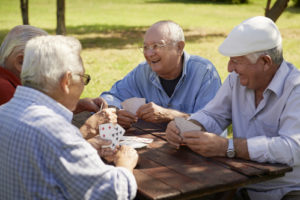Special to the Financial Independence Hub
One of the chief concerns regarding senior citizens, especially those who live alone or in assisted living facilities, is boredom. Experts in senior care know that when a person is bored or feels unstimulated this can escalate to depression, which is already another concern among the senior population.
While the lack of activity could be due to a physical ailment that prevents the person from doing things they loved to do — such as walking, running, or other highly physical activities — in many cases it’s simply that a little nudge and some positive guidance is needed. A caregiver can be instrumental in this role and encourage their client to be more active, mentally or physically.
If you work with or know a senior citizen who needs to be challenged, adding a hobby to their daily routine can make a world of difference in their mood and ultimately their overall health. These are just a few hobbies that are fun, challenging, and can help lift mood and energy levels.
Art
Art is one of the easiest hobbies to introduce because it comes in so many forms. From painting with watercolors to adult coloring books, art brings a sense of freedom and independence as there is no right or wrong way to do it; art is subjective.
As long as the client has the manual dexterity to hold the instruments art is a powerful form of therapy. In fact, some seniors who have never picked up a paintbrush or a pastel pencil in their lives find themselves becoming immersed in their work and enjoying the process, and perhaps producing a masterpiece along the way.
Puzzles
Jigsaw puzzles are another great hobby for senior citizens. Again, this type of activity engages manual dexterity and critical thinking skills and can even bring back fond memories. Who doesn’t recall having fun with jigsaw puzzles at some point in their life?
Depending on the person it might be wise to go with puzzles geared toward younger children as the pieces are larger and easier to manipulate. A senior with better manual dexterity might love the challenge of a puzzle that’s more complex. This is also a great way to get more people involved and working together, thus improving social interaction.
Games
With the exception of competitive poker, games seem to have fallen out of favor since the advent of the internet and the ability to play online. It’s safe to say that most seniors have fond memories of playing card games with friends and family. Why not retrieve that fond memory and encourage card games that involve at least two people?
Card games like bridge and cribbage are classics that most seniors have played at some point in their lives. They may have even played regularly and might love the chance to play again. Additionally, this is another great way to encourage social interaction and critical thinking skills. And there’s nothing wrong with a little competitive spirit either.
Coin Collecting
Coin collecting is another of those hobbies that seem to be dying out. Most people of a younger generation recall their grandfather or uncle having a coin collection but few people today are willing to start one. However, encouraging a senior to start or resume a coin collection can be a great way to get them involved in a hobby that they’ll love, especially if they have access to the internet and basic web research skills.
Coin collecting also feels like a treasure hunt in many ways and for that tenacious senior this can be a great outlet for a curious mind.
Birdwatching
For a senior who is housebound or has limited mobility birdwatching is a fantastic hobby that requires very little in the way of setup. A bird feeder outside an accessible window, a pair of binoculars, and a bird identification book are all you need to kick start a fantastic birdwatching hobby.
Having the ability to not only look outside but also seeing nature in action can be incredibly soothing for a person with limited mobility and help ease frustration. It’s also a challenge as they task themselves with identifying birds and learning about their behavior.
Caregivers and family members can do a great deal to help their senior clients or family members stay active by engaging them in hobbies that are fun and interesting. You’ll be surprised how a simple hobby can really change the outlook and mood of our beloved family members.
 Cher Zevala is a content coordinator who assists in contributing quality articles on various topics. In her free time she also enjoys hiking, traveling and getting to know the world around her. Cher has built up many strong relationships over the years within the blogging community and loves sharing her useful tips with others.
Cher Zevala is a content coordinator who assists in contributing quality articles on various topics. In her free time she also enjoys hiking, traveling and getting to know the world around her. Cher has built up many strong relationships over the years within the blogging community and loves sharing her useful tips with others.




